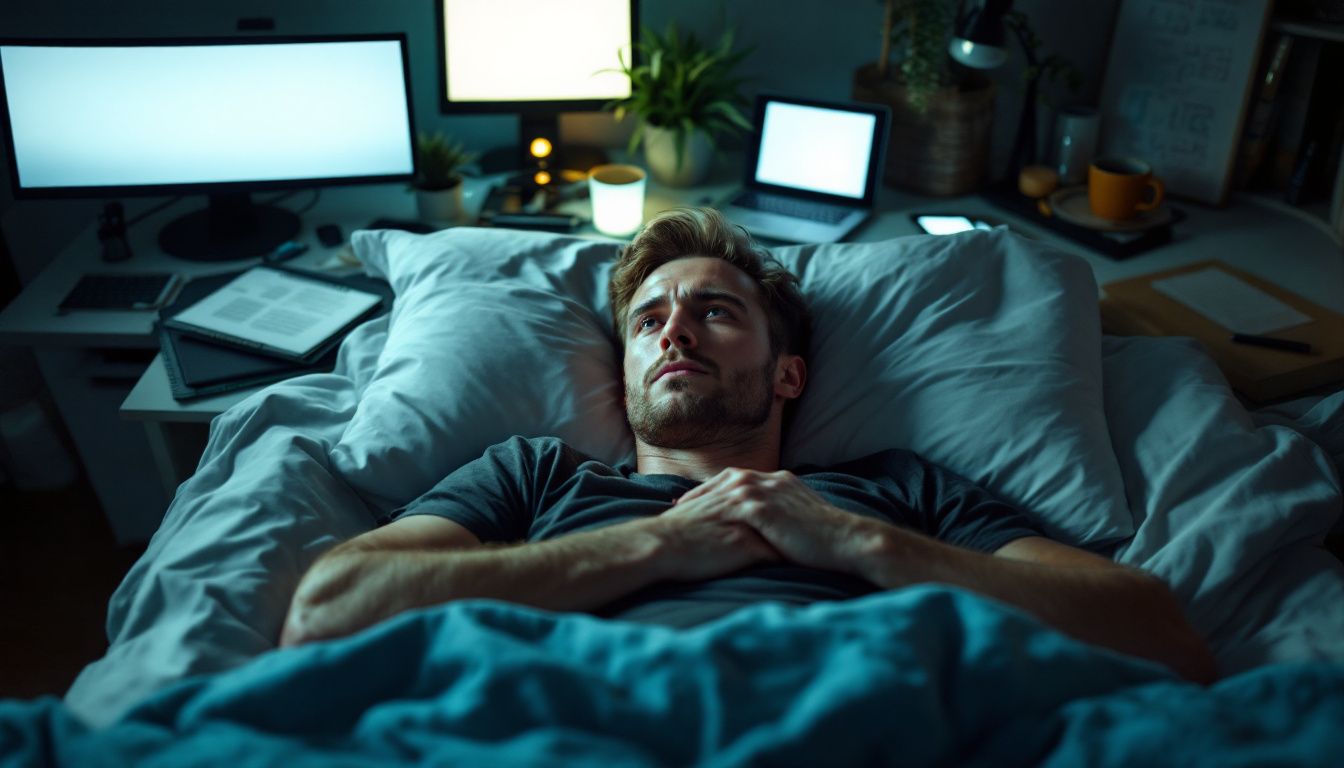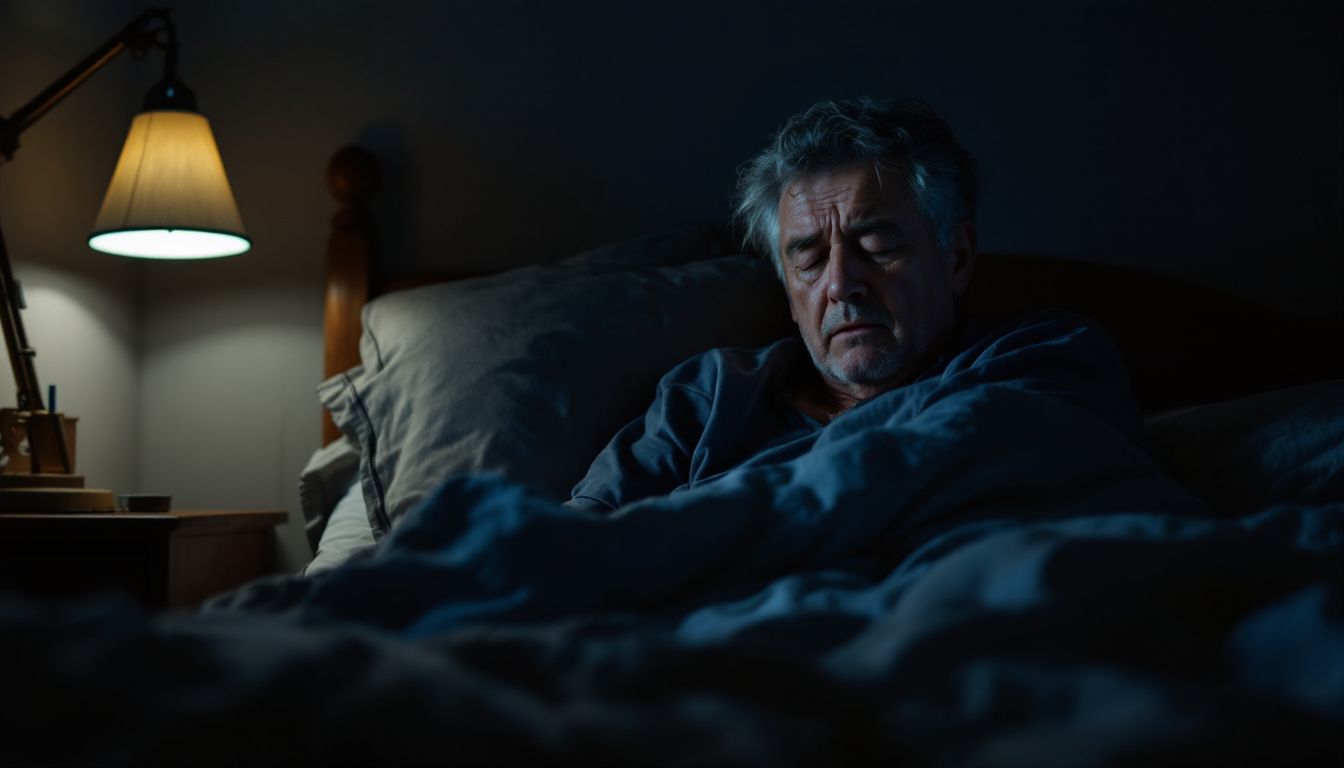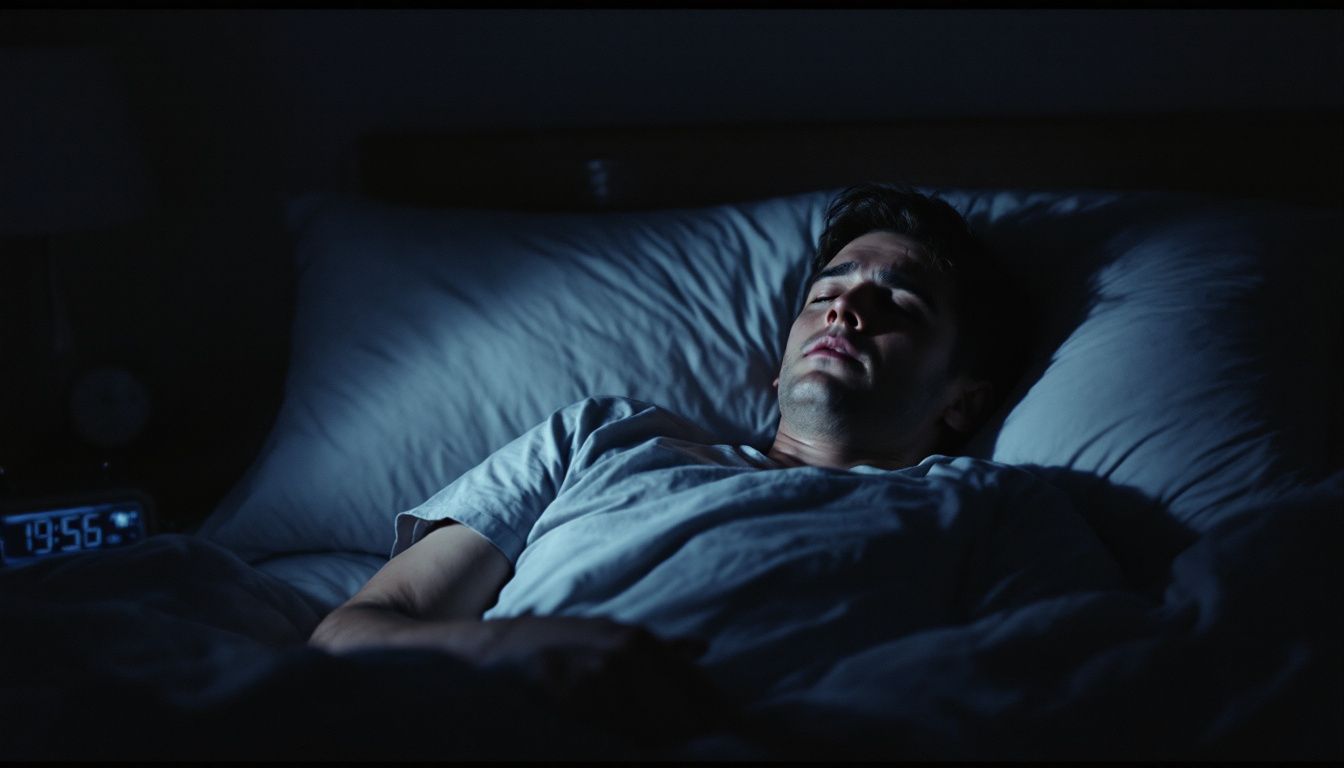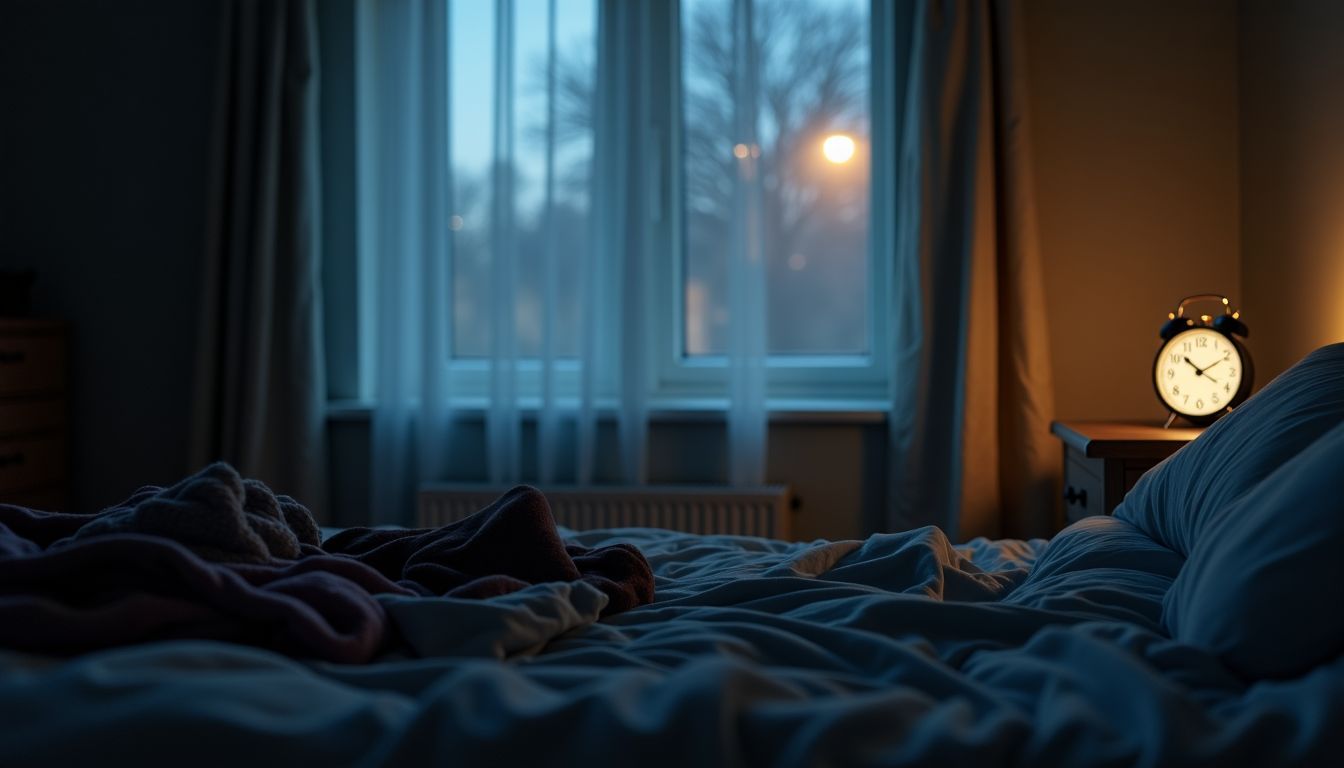Many people find it hard to sleep at night. Insomnia is a common problem that stops you from sleeping well. This article will show ways to fight sleep problems and improve your rest.
Keep reading to learn more.
Common Causes of Sleep Issues

Stress and anxiety, poor sleep environment, irregular sleep schedule, caffeine or alcohol consumption, and certain medical conditions can all contribute to difficulty sleeping. Identifying these common causes is the first step in addressing and improving sleep problems.
Stress and Anxiety
Stress and worry are big reasons people can’t sleep. They make your mind race when you try to rest. About 10% of adults have such bad sleep problems that they need a doctor’s help.
Half of them feel very anxious or sad.
Many who can’t sleep well also deal with stress every day. This makes their trouble sleeping even worse. If you’re always feeling stressed, it might be harder for you to fall asleep or stay asleep all night.
Poor Sleep Environment
After discussing how stress and anxiety can lead to sleep problems, it’s important to talk about the place where you sleep. A bad sleep environment can also make it hard for you to fall asleep and stay asleep.
Your bedroom should be a calm place that helps you rest well. If there is too much noise, light, or if your bed is not comfortable, these things can disrupt your sleep. It’s part of good sleep hygiene to make sure your room is dark, quiet, and cool.
Also, having electronic devices like TVs and phones in your bedroom can interfere with getting quality sleep. The light from screens can trick your brain into thinking it’s still daytime, which makes falling asleep difficult.
Improving these aspects of where you sleep might help fix some sleeping problems without needing medicine or therapy. Simple changes in your bedroom could lead to better rest at night.
Irregular Sleep Schedule
An inconsistent sleep schedule disrupts your body’s internal clock, leading to potential difficulties during sleep onset and maintenance. Such troubles are common among those engaged in nocturnal duties or frequent travel, as their routines are often at odds with natural circadian rhythms, causing conditions like shift work sleep disorder or jet lag.
Flying towards the east exacerbates jet lag, confusing your sleep-wake cycle and making restful sleep difficult to achieve. By maintaining regular sleep and wake times, one can promote healthier sleep patterns and enhance sleep quality.
This reduces the likelihood of chronic conditions such as insomnia or other circadian rhythm disorders arising.
Consumption of Caffeine or Alcohol
Drinking coffee, tea, or alcohol can make sleeping hard. These drinks have substances that keep you awake. Coffee and tea have caffeine. This makes your brain stay alert. Avoiding these drinks before bed helps you sleep better.
Doctors say not to have them late in the day.
Alcohol might make you feel sleepy at first, but it actually makes your sleep worse later on. It can cause you to wake up many times in the night. Cutting down on alcohol improves your rest.
If having trouble sleeping, try drinking less coffee and avoiding alcohol near bedtime.
Next, we talk about medical conditions that affect sleep.
Medical Conditions
Some medical conditions can make it hard to sleep. Sleep apnea is one where breathing stops and starts while sleeping. Restless Legs Syndrome (RLS) makes legs feel uneasy when lying down.
Both can break sleep or make it tough to fall asleep. Conditions like heart disease, type 2 diabetes, and high blood pressure are also linked with not getting enough sleep.
Medicines such as ropinirole, pramipexole, and gabapentin help with RLS signs. Dealing with these health issues might improve sleep quality. Seeking advice from a doctor who knows about sleep medicine can be a good step if you face these problems.
Symptoms of Sleep Problems

Many people struggle with symptoms of sleep problems, such as finding it hard to fall asleep and waking up frequently during the night. Despite getting some sleep, they often feel tired during the day.
Difficulty Falling Asleep
Difficulty falling asleep can be a big problem. It is one of the main signs of insomnia. Insomnia affects about 10% of people worldwide as a health issue. If you have chronic insomnia, it means you find it hard to sleep for three months or more, at least three times a week.
This trouble sleeping at night might make you feel tired during the day.
People with this issue often try different ways to help themselves sleep better. They may use relaxation techniques before bed or keep a sleep diary to track their habits. Some might even visit a sleep center or talk to doctors who specialize in sleep problems at places like Harvard Medical School.
These professionals work with patients to improve their rest and fix their sleep cycles.
Frequent Nighttime Awakenings
After talking about the trouble of falling asleep, we move to waking up a lot at night. This is a main sign of insomnia. People with sleep apnea and restless legs syndrome face this too.
They find themselves awake often during the night. This makes them feel tired in the daytime. It’s hard for them to stay alert.
Waking up many times can harm your physical and mental health. It leads to memory problems and weight gain. Some even feel sad or anxious more often because of it. If this happens a lot, talking to a sleep specialist might help you get better sleep.
Feeling Tired Despite Sleep
Moving from waking up often at night, some people still feel tired after sleeping. This is a sign of poor sleep quality. Daytime sleepiness can happen even if you spend enough hours in bed.
The average person needs 7 to 9 hours of rest each night. If you meet this but still feel tired, your sleep may not be deep or restful.
This kind of tiredness affects how well you do things during the day. It can make it hard to stay awake and focus on tasks. Also, feeling sleepy all the time might lead to taking naps that disrupt your normal sleep schedule even more.
To help with this problem, forming good sleep habits is key. Avoiding caffeine or heavy meals before bedtime can also make a big difference in how rested you feel when you wake up.
Types of Sleep Disorders

Insomnia, Sleep Apnea, Restless Legs Syndrome (RLS), and Circadian Rhythm Disorders are common types of sleep disorders that can significantly impact your rest. Understanding these conditions is crucial for better management and seeking appropriate help.
These sleep disorders vary in their causes and symptoms, so it’s important to recognize the specific characteristics of each one to address them effectively.
Insomnia
Insomnia affects about 10% of people worldwide as a health issue. This sleep disorder makes it hard for them to fall asleep, stay asleep, or get restful sleep. About one out of every three adults has symptoms of insomnia at any time.
People with chronic insomnia find this problem lasting more than three months and happening at least three nights each week.
This condition leads to feeling tired during the day, which can cause problems at work or school. Insomnia can happen on its own or because of other issues like stress, mental health conditions, or physical health troubles.
American Academy of Sleep Medicine studies show that not getting enough sleep can link to many health risks.
Sleep Apnea
Sleep apnea is a common sleep disorder that affects breathing during sleep. It leads to brief and repetitive interruptions in breathing, often caused by the relaxation of the throat muscles.
These interruptions can disturb normal sleep patterns and lead to fatigue during the day. Polysomnography, or a sleep study, is typically used to diagnose this condition.
The most prevalent type of sleep apnea is obstructive sleep apnea, which occurs when throat muscles relax excessively. This causes the airway to become partially or completely blocked during sleep, impacting proper airflow.
An estimated 25 million Americans suffer from obstructive sleep apnea alone.
Restless Legs Syndrome (RLS)
Sleep disruptions can happen due to Restless Legs Syndrome (RLS). RLS causes an uncontrollable urge to move the legs, typically at night. This can lead to difficulty falling asleep and frequent nighttime awakenings.
Medications such as ropinirole, pramipexole, and gabapentin can alleviate RLS symptoms.
Circadian Rhythm Disorders
Circadian rhythm disorders happen when a person’s internal natural clock is out of sync with their daily routine. Shift Work Sleep Disorder occurs when work schedules conflict with the body’s clock.
Jet lag disrupts sleep, especially when traveling eastward. Both conditions can lead to difficulty falling asleep and staying awake at desired times.
These disorders affect various professions, such as healthcare workers or pilots who have irregular working hours, resulting in interrupted sleep patterns. It can also impact those who travel frequently across time zones due to business or personal reasons causing them distress due to disrupted sleep-wake cycles.
Risk Factors for Sleep Problems

Risk factors for sleep problems include age, lifestyle habits, and chronic health conditions. These can significantly impact a person’s ability to get quality sleep.
Age and Aging
Insomnia tends to become more prevalent as individuals age, particularly impacting those over 60. Shifts in health, medication usage, and disturbances in sleep schedules all play a role in causing insomnia among older individuals.
Seeking assistance is vital for older adults grappling with sleep problems because of its potential influence on overall health.
Lifestyle Habits
Irregular sleep schedules, high stress, and changing work shifts can lead to insomnia. For example, night shifts disrupt your body’s internal clock. Drinking caffeinated beverages before bedtime can also make it difficult to sleep.
Also, if you are struggling with insomnia, avoiding caffeine and nicotine before bed can be a helpful way to manage the condition.
Lifestyle habits such as staying up late or consuming stimulating substances close to bedtime contribute significantly to sleeping issues. The use of electronic devices right before bed can also interfere with falling asleep due to the blue light emitted from screens affecting melatonin production in the body.
A consistent sleep schedule and creating a soothing environment for sleep are essential in managing these lifestyle factors that impact quality rest.
Chronic Health Conditions
Chronic health conditions such as type 2 diabetes, heart disease, and high blood pressure are closely associated with sleep deprivation. Research indicates that individuals with these health issues often face challenges when it comes to getting adequate sleep.
Common conditions such as sleep apnea and restless legs syndrome (RLS) can disrupt regular sleep patterns in this area.
Furthermore, it is important to note that there is a significant link between chronic health issues and the quality of sleep one obtains. For instance, individuals dealing with type 2 diabetes or high blood pressure may encounter difficulties in maintaining a consistent sleep schedule due to their condition.
This can lead to an increased risk of experiencing insomnia symptoms and other adverse effects associated with inadequate rest.
Effects of Poor Sleep on Health
Poor sleep can affect your thinking, memory, and learning. It can also lead to serious health problems like heart disease, high blood pressure, and diabetes.
Cognitive Impairment
Sleep deprivation can lead to cognitive impairment, affecting memory, attention, and decision-making. It’s like your brain is functioning with limited energy, making it hard to focus and think clearly.
With lack of sleep, you may struggle to concentrate or learn new things. This impacts daily tasks and job performance.
Persistent insomnia can impair physical and mental capabilities. Over time this affects reaction times and overall quality of life. Research shows that sleep issues increase the risk of memory problems by disrupting the brain’s ability to consolidate memories during deep sleep stages – it’s as if a good night’s rest helps “file” important information in your mind for easy retrieval later on.
Increased Risk of Chronic Illness
Inadequate sleep can raise the chances of chronic diseases such as type 2 diabetes, heart disease, high blood pressure, and stroke. These conditions are connected to not getting enough sleep due to insomnia.
For instance, people struggling with insomnia have a higher risk of developing these health issues compared to those who get sufficient rest. This means that prioritizing good sleep is crucial in preventing chronic illness.
Sleep deprivation due to insomnia increases the risks for type 2 diabetes, heart disease, high blood pressure, and stroke. Chronic health conditions like type 2 diabetes, heart disease, and high blood pressure are linked to sleep deprivation.
Emotional and Mental Health Issues
Sleep problems can contribute to emotional and mental health challenges. Insufficient sleep as a result of insomnia heightens the likelihood of experiencing depression and anxiety.
About 50% of individuals dealing with chronic insomnia also encounter anxiety or depression.
These mental challenges can worsen sleep issues, establishing a difficult cycle to overcome. It’s crucial to tackle both the emotional and mental facets when addressing sleep problems, as they frequently intertwine.
Seeking professional assistance for these interrelated issues is vital in enhancing overall well-being.
Transitioning from this concerning link between sleep and mental health, let’s explore solutions to enhance sleep.
Solutions to Improve Sleep
Establish a consistent sleep routine by going to bed and waking up at the same time every day, even on weekends. Read more about improving your sleep for better health.
Establishing a Consistent Routine
To manage insomnia, it’s essential to establish a consistent sleep schedule. Adults typically need 7 to 9 hours of sleep every night. Keeping regular bedtime and wake-up times helps regulate the body’s internal biological clock, promoting better sleep quality.
This routine can aid in combating difficulties falling asleep and staying awake during the day.
It’s also important to mention that maintaining a consistent routine is one of the solutions for managing insomnia mentioned above.
Creating a Sleep-Friendly Environment
A sleep-friendly environment is essential for good sleep. To make your bedroom conducive to sleep, keep it cool and dark. Limit noise and use comfortable bedding. Consider using white noise machines or earplugs if noise is an issue.
Remove electronic devices as their light can disrupt sleep.
Keep a regular bedtime routine to signal your body that it’s time to wind down. Avoid stimulating activities such as vigorous exercise before bed.
Strive to create a tranquil and peaceful space that promotes relaxation and restful sleep with calming scents like lavender, chamomile, or vanilla.
For those struggling with insomnia, Cognitive Behavioral Therapy for Insomnia (CBT-I) has been proven effective in improving sleep quality without the need for medication.
Seeking Professional Help
When dealing with persistent sleep issues, it’s essential to seek professional assistance. Professionals can offer customized treatment plans and therapies tailored to individual needs.
For instance, cognitive behavioral therapy (CBT) has shown to be effective in addressing insomnia without relying on medications. Additionally, healthcare providers might suggest polysomnography (sleep studies) to accurately diagnose and understand the seriousness of sleep disorders.
In some instances, medication may be prescribed to manage chronic insomnia; however, this should always be done under professional guidance due to potential side effects and dependencies associated with certain sleep aids.
It’s vital to recognize that effectively addressing chronic insomnia often requires sustained commitment and support from healthcare providers. Seeking timely help enables individuals to tackle their sleep difficulties proactively before they escalate into more severe health issues.
Conclusion
Sleep problems can arise from different factors such as stress, unfavorable environment, irregular timetable, or consumption of caffeine and alcohol. Indications of sleep issues encompass trouble initiating sleep and feeling fatigued despite rest.
It’s essential to tackle sleep disorders promptly for improved health and performance. Developing a regular schedule, establishing a sleep-conducive setting, and consulting a specialist are crucial measures to enhance sleep quality.
Make addressing your sleep-related worries a priority for holistic well-being.

